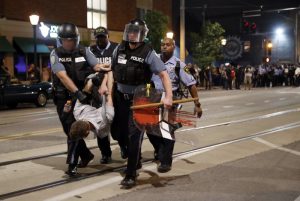ST. LOUIS (AP) — Protests turned violent for the second night on Saturday in reaction to the acquittal of a white former St. Louis police officer in the fatal shooting of a black man, as a small group of demonstrators refused to disperse, breaking windows and throwing objects at police in riot gear, who eventually moved in and made arrests.
The confrontation took place in the Delmar Loop of the St. Louis suburb of University City — known for concert venues, restaurants, shops and bars and including the famous Blueberry Hill where rock legend Chuck Berry played for many years. The area had been the scene of a tense but calm march earlier in the evening that ended with organizers calling for people to leave and reconvene Sunday afternoon.
But a small group of protesters refused to go. Police ordered them to disperse, saying the protest was unlawful. Hundreds of police in riot gear eventually moved in with armored vehicles. The demonstrators retreated down a street, breaking windows and throwing objects at police.
Several protesters were seen in handcuffs but the number of arrests was not immediately known. At least one demonstrator was seen being treated after he was hit with pepper spray.
The sudden eruption followed a day of non-violent demonstrations at suburban shopping malls and during the march in University City.
Demonstrators shouted slogans such as “black lives matter” and “it is our duty to fight for our freedom” as they marched through West County Center mall in the city of Des Peres, west of St. Louis, to decry a judge’s verdict Friday clearing ex-officer Jason Stockley of first-degree murder in the 2011 shooting of Anthony Lamar Smith. A group also demonstrated at Chesterfield Mall in the suburbs and at a regional food festival.
Organizers took their grievances to the suburbs Saturday to spread the impact of the protests beyond predominantly black neighborhoods to those that are mainly white.
“I don’t think racism is going to change in America until people get uncomfortable,” said Kayla Reed of the St. Louis Action Council, a protest organizer.
Susanna Prins, 27, a white woman from University City, carried a sign reading, “White silence is violence.”
“Not saying or doing anything makes you complicit in the brutalization of our friends and neighbors,” Prins said.
Smith’s death is just one of several high-profile U.S. cases in recent years in which a white officer killed a black suspect, including the 2014 killing of Michael Brown in nearby Ferguson that sparked months of angry and sometimes violent protests.
Federal prosecutors said Saturday they won’t open a new civil rights investigation into the killing. Justice Department spokeswoman Lauren Ehrsam said the department decided in September not to prosecute, but didn’t announce it then to avoid affecting the judge’s decision.
After Stockley was acquitted on Friday, sporadic violence resulted in nearly three-dozen people arrested and 11 police officers injured, including a broken jaw and dislocated shoulder, police said. Five officers were taken to hospitals. Police said that 10 businesses were damaged. Protesters also broke a window and spattered red paint on the home of St. Louis Mayor Lyda Krewson.
Krewson said she was not home at the time but her family was. She said it was “irritating” to have her house vandalized.
“This story is not about whether I got my windows broken or not. This is about coming together to have a better St. Louis for all of us,” she told a news conference Saturday.
Reed said protesters went to Krewson’s house because she was not in the streets with the people even though she had expressed support on social media.
Stockley shot Smith, 24, after the suspected drug dealer fled from officers trying to arrest him.
Stockley testified he felt he was in danger because he saw Smith holding a silver revolver when the suspect backed his car toward officers and sped away.
Prosecutors said Stockley planted a gun in Smith’s car after the shooting. The officer’s DNA was on the weapon but Smith’s wasn’t. Dashcam video from Stockley’s cruiser recorded him saying he was “going to kill this (expletive).” Less than a minute later, he shot Smith five times.
Stockley’s lawyer dismissed the comment as “human emotions” during a dangerous pursuit. St. Louis Circuit Judge Timothy Wilson, who said prosecutors didn’t prove beyond a reasonable doubt that Stockley murdered Smith, said the statement could be ambiguous.
Stockley, 36, who left the force in 2013 and moved to Houston, told the St. Louis Post-Dispatch after the verdict that he understands how the video looks bad, but insisted he did nothing wrong.
“I know everyone wants someone to blame, but I’m just not the guy,” Stockley said.
___
AP

